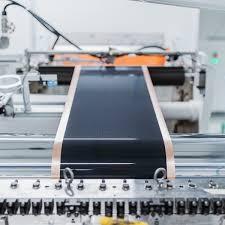Inquire
Li-Ion Battery Electrode Coating Market Opportunities Fueling Next-Generation Electric Vehicle and Grid Storage

The Li-Ion battery electrode coating market is witnessing rapid developments as global demand for energy storage solutions and electric vehicles (EVs) continues to accelerate. With the rising need for high-performance lithium-ion batteries, manufacturers are focusing on advanced electrode coatings that enhance battery efficiency, longevity, and safety. Electrode coatings play a crucial role in ensuring uniform lithium-ion distribution, minimizing dendrite formation, and reducing internal resistance, directly impacting battery performance and overall lifecycle.
Recent advancements in electrode coating materials have opened new avenues for innovation. Nano-structured coatings, conductive polymers, and composite materials are increasingly being adopted to improve charge retention, thermal stability, and electrochemical performance. These materials not only optimize energy density but also allow faster charging cycles, a critical requirement for electric vehicles and grid storage applications. As a result, companies are investing heavily in research and development to produce cost-effective, high-quality coatings tailored to specific battery chemistries, such as lithium nickel manganese cobalt oxide (NMC) and lithium iron phosphate (LFP).
The market is also being shaped by the increasing adoption of automated and precision coating technologies. Advanced coating techniques like slot-die, spray, and roll-to-roll processes ensure uniform thickness and consistency, reducing material waste and production costs. Manufacturers are leveraging digital control systems and AI-based monitoring to achieve precise electrode formulation, enhancing battery reliability and performance. These innovations are not only transforming battery manufacturing but also enabling large-scale production to meet the growing global energy storage demand.
Sustainability and environmental concerns are key drivers influencing the Li-Ion battery electrode coating market. With stricter regulations on chemical usage and waste management, companies are shifting toward eco-friendly coatings and solvent-free processes. Water-based dispersions and biodegradable binders are increasingly preferred over traditional organic solvents, reducing environmental impact while maintaining high electrochemical performance. This shift aligns with global sustainability initiatives and strengthens the market's long-term growth prospects.
Regional developments are also shaping market dynamics. Asia-Pacific, particularly China, Japan, and South Korea, continues to dominate production and technological innovation in electrode coatings due to strong EV adoption and government incentives. North America and Europe are witnessing significant investments in battery manufacturing facilities, focusing on localized production and supply chain resilience. Strategic collaborations between material suppliers, battery manufacturers, and automotive companies are driving technological breakthroughs and accelerating the commercialization of next-generation coatings.
Market competition is intensifying, with key players investing in patents, proprietary formulations, and advanced production facilities. Companies are emphasizing differentiation through high-performance coatings capable of supporting fast charging, extended cycle life, and enhanced safety. Additionally, mergers, acquisitions, and partnerships are facilitating technology exchange and access to new markets. The emphasis on innovation and scalability is expected to maintain a healthy growth trajectory for the Li-Ion battery electrode coating market over the next decade.
Looking ahead, the market’s growth is expected to be fueled by the increasing demand for electric vehicles, renewable energy integration, and grid-scale energy storage solutions. Emerging technologies such as solid-state batteries and hybrid energy storage systems will require specialized coatings, further driving innovation in the sector. Research efforts focusing on improving electrode adhesion, ionic conductivity, and thermal management will continue to enhance battery performance, reliability, and cost-effectiveness.
In conclusion, the Li-Ion battery electrode coating market is undergoing transformative developments, driven by technological innovation, sustainability priorities, and increasing global demand for efficient energy storage. With continuous advancements in materials, manufacturing processes, and automation, the market is poised for significant growth, contributing to the evolution of high-performance batteries for diverse applications, from electric vehicles to renewable energy storage.
- Managerial Effectiveness!
- Future and Predictions
- Motivatinal / Inspiring
- Other
- Entrepreneurship
- Mentoring & Guidance
- Marketing
- Networking
- HR & Recruiting
- Literature
- Shopping
- Career Management & Advancement


 SkillClick
SkillClick